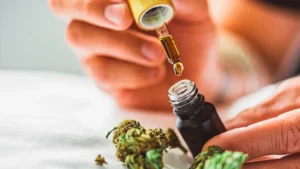Cannabidiol (CBD) was efficient in preventing chemotherapy-induced neuropathic pain in a new study published by the Journal of Pharmacy and Pharmacology.
 The study “aimed to investigate the effect of cannabidiol (CBD) on type 4 Toll-like receptors (TLR4), glial cells and pro-inflammatory cytokines during the neuropathic pain induced by the chemotherapy agent paclitaxel (PTX), as well as the involvement of the endocannabinoid system in this process”, states the study’s abstract, which was authored by researchers at the Federal University of Alfenas and the University of Sao Paulo (both in Brazil).
The study “aimed to investigate the effect of cannabidiol (CBD) on type 4 Toll-like receptors (TLR4), glial cells and pro-inflammatory cytokines during the neuropathic pain induced by the chemotherapy agent paclitaxel (PTX), as well as the involvement of the endocannabinoid system in this process”, states the study’s abstract, which was authored by researchers at the Federal University of Alfenas and the University of Sao Paulo (both in Brazil).
For the study male mice were subjected to PTX-induced neuropathic pain. To evaluate the involvement of the TLR4, glial cells and cannabinoid CB2 receptor, specific inhibitors or antagonists were intrathecally administered.
“The western blotting and immunofluorescence assay was performed to evaluate the spinal expression of TLR4, microglia, astrocytes and cannabinoid CB2 receptor”, claim researchers. “The levels of spinal pro-inflammatory cytokines and endocannabinoids were determined by enzyme-linked immunosorbent assay and liquid chromatography-mass spectrometry analysis, respectively.”
Researchers found that “CBD prevented PTX-induced neuropathic pain, and the cannabinoid CB2 receptor antagonist AM630 reversed this effect. In addition, CBD treatment inhibited the spinal expression of TLR4 and Iba1 in mice with neuropathic pain.”
CBD also “increased spinal levels of endocannabinoids anandamide and 2-arachidonoylglycerol, and reduced levels of cytokines in mice with neuropathic pain.”
The study concludes: “CBD was efficient in preventing PTX-induced neuropathic pain, and this effect may involve inhibition of the TLR4 on microglia spinal with activation of the endocannabinoid system.”
The study’s full abstract can be found below.
Abstract
Objectives: This study aimed to investigate the effect of cannabidiol (CBD) on type 4 Toll-like receptors (TLR4), glial cells and pro-inflammatory cytokines during the neuropathic pain induced by the chemotherapy agent paclitaxel (PTX), as well as the involvement of the endocannabinoid system in this process.
Methods: Male C57BL6 mice were subjected to PTX-induced neuropathic pain. To evaluate the involvement of the TLR4, glial cells and cannabinoid CB2 receptor, specific inhibitors or antagonists were intrathecally administered. The western blotting and immunofluorescence assay was performed to evaluate the spinal expression of TLR4, microglia, astrocytes and cannabinoid CB2 receptor. The levels of spinal pro-inflammatory cytokines and endocannabinoids were determined by enzyme-linked immunosorbent assay and liquid chromatography-mass spectrometry analysis, respectively.
Key findings: CBD prevented PTX-induced neuropathic pain, and the cannabinoid CB2 receptor antagonist AM630 reversed this effect. In addition, CBD treatment inhibited the spinal expression of TLR4 and Iba1 in mice with neuropathic pain. CBD also increased spinal levels of endocannabinoids anandamide and 2-arachidonoylglycerol, and reduced levels of cytokines in mice with neuropathic pain.
Conclusions: CBD was efficient in preventing PTX-induced neuropathic pain, and this effect may involve inhibition of the TLR4 on microglia spinal with activation of the endocannabinoid system.

